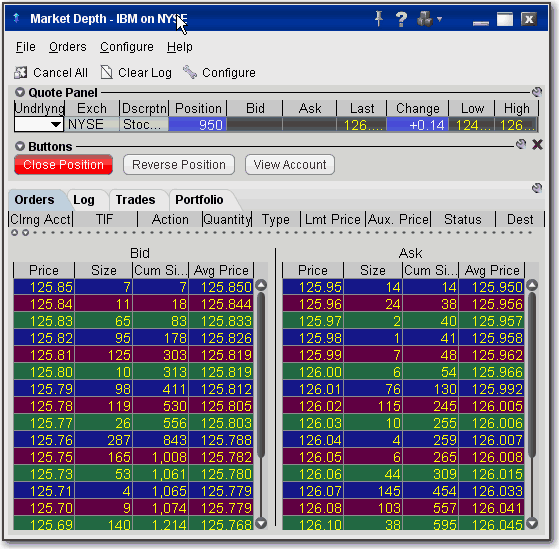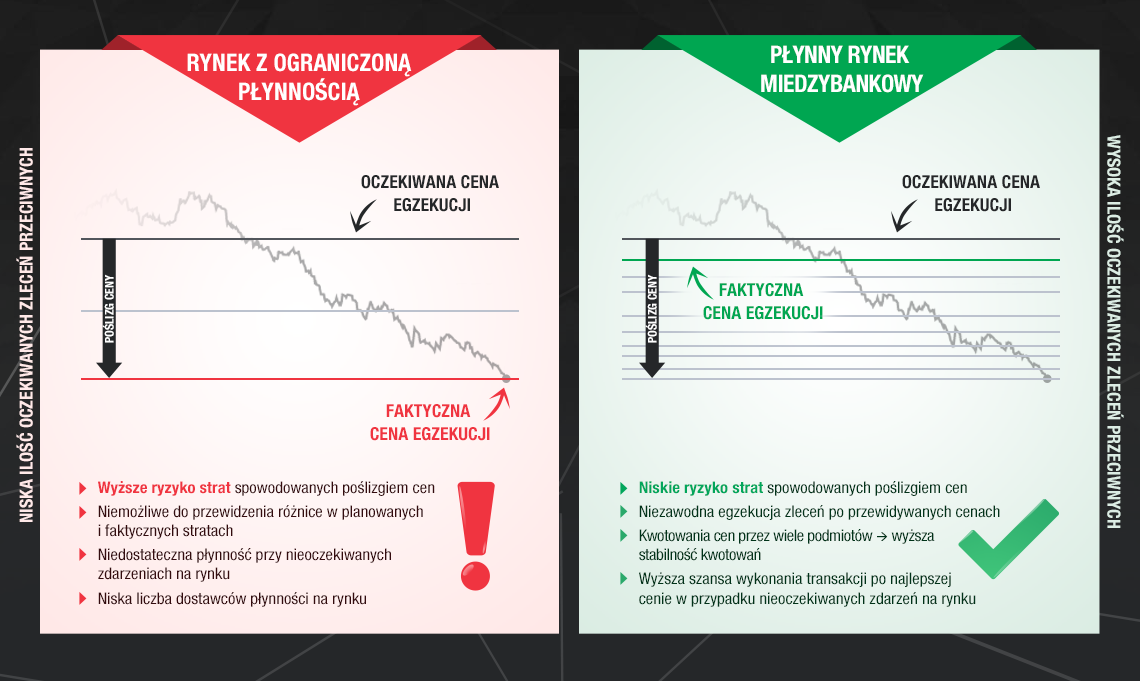Execution of orders is [key] important
As an active investor, you will certainly agree that order execution and its quality is one of the key aspects of trading for any investor. If you are trading Forex then these aspects of the market should be important to you. But if you are not aware of it, then now is a good time to read the article below.
What is Order Execution Quality?
The concept of order execution can be understood as the difference between the expected and the actual transaction price.
If you place an order on the market at the current market price (this also applies to stop-loss and profit target), the order does not always have to be made at the expected price, but it can be done at a short distance from the price. This difference is called slipping (slippage) and every investor wants to avoid such a situation.
Why is it worth being interested in what is the quality of the execution Your broker? (impact of the quality of order execution on profit)
- For the most part, worse prices in the case of market orders and stop orders - direct loss for the investor on each such order.
- Deviations distort the investment plan and bring the randomness aspect to the strategy.
Quality of executions in various types of orders
It is important to remember that your stop-losses are executed as standard at the market price. Slips can be positive as well as negative. However, in practice, investors face the negative ones more often. We will explain the reason for this below.
 The moment we have a stop-loss triggered, the price must face us for this stop-loss to be triggered. So at the moment of the desired execution of the order, the price moves in the direction not desirable for us. Negative slippage occurs when the price moves even further against us just before the order is executed. This process is often in the millisecond order, so it's hard to see at first glance. A slip in such cases normally means that our stop-loss has realized at a lower price.
The moment we have a stop-loss triggered, the price must face us for this stop-loss to be triggered. So at the moment of the desired execution of the order, the price moves in the direction not desirable for us. Negative slippage occurs when the price moves even further against us just before the order is executed. This process is often in the millisecond order, so it's hard to see at first glance. A slip in such cases normally means that our stop-loss has realized at a lower price.
READ NECESSARY: What is the importance of the speed of execution of orders?
It is also a fact that traders use stop-loss orders much more often than take-profit orders. There may be more reasons for this slippage. Most often, slips have a lot to do with the quality of the market on which orders are executed (low liquidity, lower quality technology). When the price, when the broker / market executes our order, changed its direction, we could get a positive slippage - this is obviously the much less likely situation. Slips are generally undesirable and can result in the loss of a significant proportion of gains or aggravation of losses.
The price slippages violate the investment strategy
Apart from the fact that in the long term, slips may constitute a significant share of our costs (the so-called hidden costs), we must also bear in mind another major inconvenience. Uncertainty at what price our order will be executed can significantly affect our percentage profit, our planned risk-reward strategy, and overall, can significantly affect our scheduled investment strategy. Especially when the trader speculates on a smaller price difference, the slippage will have a greater impact on his success.
Example
Intraday (daily) investor Janusz has an average stop-loss of 10 pips, the average profit target 20 pips and 40% of its transactions are profitable.
Without slipping on stop-losses, Janusz should earn 10 pips on 20 transactions (6 x loss of 10 pips and 4 x profit of 20 pips).
If the average slippage in the case of stop-loss reaches 1 pips, this will mean that Janusz's risk is not 10, but 11 pips, and his losses will not be 60 but 66 pips. Janusz's profit will fall by a whole of 30% on 14 pips.
At the same time, we believe that Janusz thought through his strategy quite well, in theory, of course. For some investors, the line between profitability and loss can be so thin that slippage alone can cause a loss.
Of course, for investors with wider stop-losses, slippages are not that significant. But it's still about money that can be saved. The aspect of the market entry / exit price bias can send the entire strategy to a basket on paper.
How to reduce the scale of slips
In order for us to understand the solution to this problem, we must first understand the reason. Aside from the possibility of technical delays in the broker's systems due to lower quality technology, the reason for slippage is also the insufficient liquidity of the market in which we trade. There are still many orders flowing through each market. The more there are, the greater the chance that our order will "clash" with the most convenient reverse order. It is called the depth of the market. The deeper the market, the denser its structure. It may happen that, for example, shares at the price that we saw on the monitor at the time of placing the order may, for example, be sold faster to another investor. Their offered quantity is not large enough to fulfill our entire order.
If we trade in a more liquid and deeper market, the more chances are that there will be an offer from another entity that will replace the role of the former and be our other party. It is important that in the liquid market the orders are usually higher, so the chance of fast execution of the order is higher.
READ ALSO: What are the price slips resulting from?
If the number of orders on the market is low. Differences between expected and actual prices will be relatively large. Otherwise, if there are a lot of orders on the market, our chance of getting the best execution (ie quick filling at the desired price) also increases.
The smoother the market, the more confident the faster and more accurate execution of the order. Because slides in most cases have a negative impact on our profit, it means savings for us and greater certainty of the expected results.
We can not forget that trading in a very liquid market significantly reduces the risk of executing an order at extremely unfavorable prices in the case of big unexpected market events. If an investor trades only with one entity, which does not have to provide price quotation at the moment and does not have to have sufficient liquidity to meet the sudden common interest of many customers due to an unexpected message. Let's mention the Swiss franc.
Interbank market drug slips
You certainly know that currency market is the largest market in the world in terms of turnover. Its problem, however, is that it is decentralized.
In practice, this means that many investors are trading on various local markets created by individual brokers or, for example, by one bank and thus can not benefit from the liquidity of the entire market.
Most of the turnover on the currency market takes place between the largest global banks such as Citibank, Deutsche Bank, JP Morgan, Goldman Sachs, etc. The list of the largest banks according to turnover on the forex market is found here.
These banks, of course, do not just want to trade with several parties, but also with other entities, thus ensuring the largest number of orders. With a large number of orders, they get better prices for themselves, and most importantly they lend currency data for interest to others (or swap in the case of holding positive and negative values overnight). These banks compete with each other, overtaking in offers to complete the next order.
On the interbank market, around 70% of all interbank currency transactions are traded, and, of course, also includes many other entities that derive profits from this interbank competition, and more precisely from the high liquidity of a given market.
An individual trader can also join interbank trading. But it is not that simple. The ECN broker does not always turn out to be the ECN we dream about and gives us access to only a part of this liquidity. So what can we do to reach this relevant market? You can find out from ours previous article.






















![Forex Club – Tax 9 – Settle tax on a foreign broker [Download the Application] Forex Club - Tax 9](https://forexclub.pl/wp-content/uploads/2024/02/Forex-Club-Podatek-9-184x120.jpg?v=1709046278)
![Trading View platform – solutions tailored to the needs of traders [Review] trading view review](https://forexclub.pl/wp-content/uploads/2024/03/trading-view-recenzja-184x120.jpg?v=1709558918)
![How to connect your FP Markets account to the Trading View platform [Guide] fp markets trading view](https://forexclub.pl/wp-content/uploads/2024/02/fp-markets-trading-view-184x120.jpg?v=1708677291)
![How to invest in ChatGPT and AI? Stocks and ETFs [Guide] how to invest in chatgpt and artificial intelligence](https://forexclub.pl/wp-content/uploads/2023/02/jak-inwestowac-w-chatgpt-i-sztuczna-inteligencje-184x120.jpg?v=1676364263)


![WeWork – the anatomy of the collapse of a company valued at $47 billion [WeWork, part II] wework bankruptcy story](https://forexclub.pl/wp-content/uploads/2024/04/wework-bankructwo-historia-184x120.jpg?v=1711729561)
![Adam Neumann – the man who screwed up Softbank [WeWork, part AND] adam neumann wework](https://forexclub.pl/wp-content/uploads/2024/04/adam-neumann-wework-184x120.jpg?v=1711728724)





![How to transfer shares to another brokerage office [Procedure description] how to transfer shares to another brokerage house](https://forexclub.pl/wp-content/uploads/2024/03/jak-przeniesc-akcje-do-innego-biura-maklerskiego-184x120.jpg?v=1709556924)

![The most common mistakes of a beginner trader - Mr Yogi [VIDEO] Scalping - The most common mistakes of a beginner trader - VIDEO](https://forexclub.pl/wp-content/uploads/2024/03/Scalping-Najczestsze-bledy-poczatkujacego-tradera-VIDEO-184x120.jpg?v=1711601376)
![Learning patience: No position is also a position - Mr Yogi [VIDEO] Scalping - Learning patience - No position is also a position - VIDEO](https://forexclub.pl/wp-content/uploads/2024/03/Scalping-Nauka-cierpliwosci-Brak-pozycji-to-tez-pozycja-VIDEO-184x120.jpg?v=1710999249)
![When to exit a position and how to minimize losses - Mr Yogi [VIDEO] Scalping - When to exit a position and how to minimize losses - VIDEO](https://forexclub.pl/wp-content/uploads/2024/03/Scalping-Kiedy-wyjsc-z-pozycji-i-jak-minimalizowac-straty-VIDEO-184x120.jpg?v=1710336731)


![Execution of orders is [key] important execution of orders](https://forexclub.pl/wp-content/uploads/2018/03/egzekucja-zlecen.jpg?v=1599373826)



![Building a risk management plan - How to do it? [Guide] risk management](https://forexclub.pl/wp-content/uploads/2021/12/zarzadzanie-ryzykiem-300x200.jpg?v=1639495023)
![Automatic Stop Loss on MetaTrader 5 - how to do it? [Video] auto-stop-loss-mt](https://forexclub.pl/wp-content/uploads/2021/11/auto-stop-loss-mt-300x200.jpg?v=1637831541)
![Execution of orders is [key] important](https://forexclub.pl/wp-content/uploads/2018/03/40882430372_c88d0e276f_b-102x65.jpg)
![Execution of orders is [key] important esma lever](https://forexclub.pl/wp-content/uploads/2017/06/esma-2-102x65.jpg)










Leave a Response